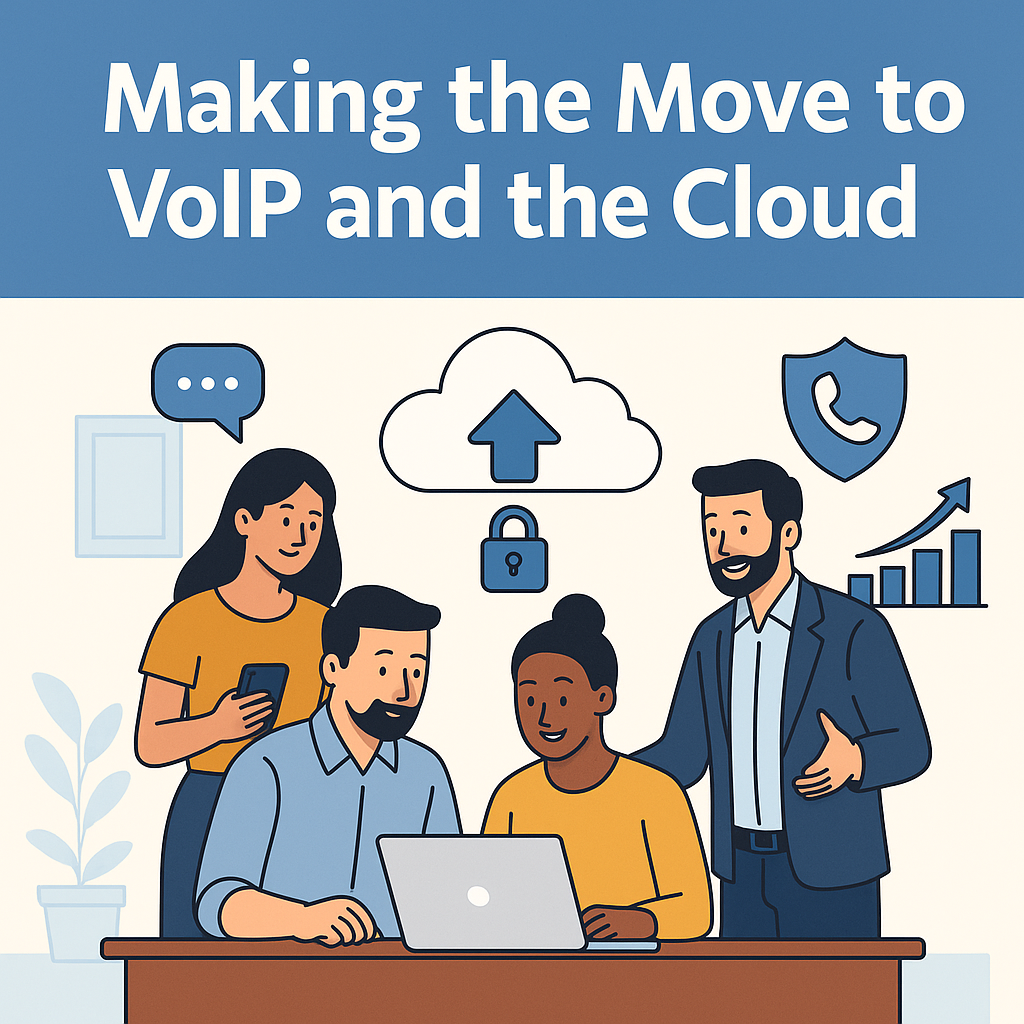7 Powerful Reasons Why Small Businesses Are Moving to VoIP and the Cloud

Today’s business landscape, business owners are seeking flexibility, scalability, and cost-efficiency to improve a companies overall results — and that’s exactly what you get when you make the move to VoIP and the cloud. Whether you’re managing a team of 5 or 50, staying connected with customers and collaborating internally has never been more critical.
Traditional phone systems and on-premise servers may have served you in the past, but let’s face it — they’re now more of a liability than an asset. Voice over IP (VoIP) and cloud services offer a modern, secure, and agile way for small businesses to communicate, store data, and scale quickly — without blowing the budget.
As a telecom expert with years of experience guiding small and mid-sized businesses through digital transformation, I’m here to break down why this shift matters, what the real-world benefits are, and how you can embrace the change with confidence.
What Is VoIP and the Cloud?
Before diving into benefits, let’s define what we’re talking about.
- VoIP (Voice over Internet Protocol) allows you to make and receive phone calls using an internet connection instead of a traditional phone line. Think Zoom, Microsoft Teams, or a full-featured business phone system hosted online.
- Cloud computing means storing your files, software, and applications on remote servers that can be accessed anytime, anywhere — instead of relying on a physical server in your office.
Together, they eliminate the need for outdated infrastructure, slashing costs and supercharging your operations.
Why Small Businesses Are Making the Shift
Let’s explore the key reasons savvy entrepreneurs and small business owners are ditching legacy systems and saying “yes” to VoIP and the cloud.
Save Money Without Sacrificing Quality
Legacy phone systems are expensive to install and maintain. With VoIP:
- No bulky hardware is needed.
- Long-distance and international calls are often included or drastically cheaper.
- Maintenance costs drop to near zero — your provider handles it.
Cloud services follow the same model:
- No need for expensive servers or IT staff to manage them.
- Pay only for the storage and features you use.
- Software updates and backups? Handled automatically.
Bottom line? You get enterprise-level tech without the enterprise price tag.
Flexibility and Mobility for a Remote World
Today’s work environment is all about mobility and hybrid flexibility. With VoIP and cloud tools:
- Your team can answer calls from any device — desk phone, laptop, mobile.
- Cloud-based documents and software can be accessed 24/7, from anywhere in the world.
- You’re no longer tied to an office — you work where your team works.
This is especially powerful for sales teams, support agents, and small companies that rely on outsourced or distributed teams.
Scalability as You Grow
Adding a new team member used to mean wiring in a new phone line or installing a new workstation.
Now?
- With VoIP, you can add a user with a few clicks.
- Cloud tools allow you to increase storage, add licenses, and access more features instantly.
Whether you’re onboarding 2 or 20 new employees, you scale without disruption.
Enhanced Professionalism and Features
VoIP services aren’t just “cheap phones” — they’re feature-rich communication hubs.
You get:
- Auto-attendants (press 1 for sales, 2 for support)
- Voicemail to email
- Call forwarding and routing
- CRM integration
- Video conferencing
These features give your small business a big-business presence — without the overhead.
Improved Security and Business Continuity
Worried about security? You should be — but VoIP and cloud providers take it seriously.
They offer:
- End-to-end encryption for voice and data
- Regular software updates to patch vulnerabilities
- Multi-location data centers with backups and failover protection
And in case of disaster — a power outage, flood, or hardware failure — your files and calls can still be accessed from anywhere, ensuring business never stops.
Boosted Team Collaboration and Productivity
Collaboration is the heartbeat of every successful team. Cloud platforms integrate seamlessly with communication tools like:
- Microsoft Teams
- Google Workspace
- Slack
- Zoom
- Project management tools like Trello, Asana, or Monday.com
This ensures your people don’t just talk — they collaborate, share files, meet virtually, and stay aligned in real-time.
Staying Competitive in a Digital World
Customers today expect fast, seamless communication. If your tech is clunky, slow, or outdated, you risk losing business to a more connected competitor.
VoIP and cloud tech:
- Allow for instant communication with clients.
- Support omni-channel engagement (calls, chats, video).
- Enable digital services and automation that your customers love.
By modernizing your systems, you send a clear message: we’re agile, we’re responsive, and we’re ready.
How to Make the Transition Smoothly
Ready to ditch the old-school setup and go digital? Here’s how to do it right:
1. Audit Your Current Tech Stack
- What are your current communication tools?
- Where are your files stored?
- What’s costing you too much or slowing your team down?
2. Choose the Right VoIP Provider
Look for:
- Uptime guarantees (99.99% or higher)
- Business-grade support
- Features like call analytics, CRM integration, and mobile apps
Top picks for small businesses: RingCentral, Nextiva, 8×8, Zoom Phone
3. Select a Scalable Cloud Solution
Options like Google Workspace, Microsoft 365, Dropbox Business, or AWS allow you to:
- Store files securely
- Collaborate in real-time
- Manage users easily
4. Train Your Team
Even the best system fails without adoption. Train employees on:
- New phone features
- Accessing cloud storage
- Best practices for cybersecurity and remote work
5. Work with a Telecom Consultant
A certified telecom advisor can help you:
- Compare vendors
- Negotiate better pricing
- Migrate data and phones with zero downtime
FAQs
Is VoIP reliable for small businesses?
Absolutely. With a stable internet connection and a reputable provider, VoIP offers HD-quality calls and uptime of 99.99%.
Will I lose my phone number if I switch?
No. Most VoIP providers support number porting, so you keep your business number.
Is the cloud safe for storing sensitive files?
Yes — as long as you choose trusted providers and follow best practices like two-factor authentication and encryption.
How much does VoIP cost?
Plans typically start around $20 per user/month, depending on features. Far less than traditional phone systems!
Do I need to buy special hardware?
Not necessarily. Many VoIP systems work with your existing devices. You can also use IP desk phones or mobile apps.
Conclusion
Making the move to VoIP and the cloud isn’t just a tech upgrade — it’s a smart business decision. For small businesses, it means operating with agility, improving client experiences, saving money, and preparing for the future.
Whether you’re just starting out or ready to scale, the right cloud and communication tools can transform how you work — and how your customers experience your brand.
Don’t wait for outdated tech to hold you back. Step into the future of business communications today.
We can Help, https://axxesstelecom.com/get-a-quote
